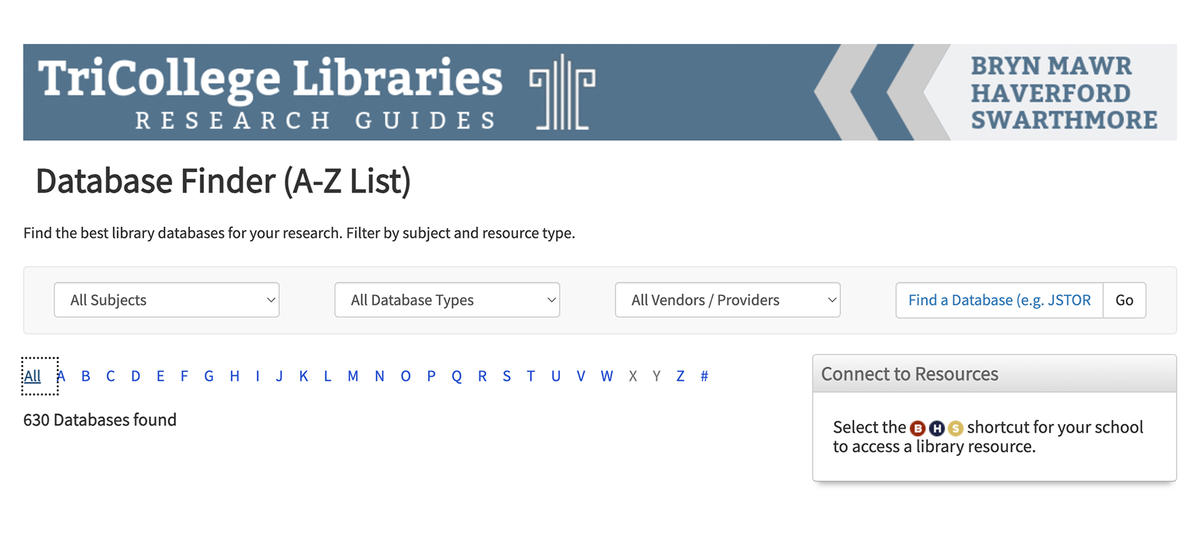Staff Spotlight: Johanna Riordan

Database Finder webpage.
Details
In this edition of the Staff Spotlight, Electronic Resources Librarian, Johanna Riordan, answers questions about her work at Haverford Libraries.
Johanna is the electronic resources librarian at Haverford. Her work focuses on making journals and databases available on Tripod, ensuring that patrons have access to Haverford College’s electronic resources collection. Making materials available electronically increases accessibility; e-resources eliminate many barriers to access, allowing patrons the benefit of format choice and flexibility of location. Johanna also works to identify and incorporate new electronic resources into Haverford’s collections. Her work helps to create a more equitable environment for scholarship.
For this edition of The Staff Spotlight, Johanna answers questions about electronic resources, librarianship, and scholarship:
- How has access changed, given the shift to electronic resources?
“The biggest shift, particularly with journals and databases, is that one person using it doesn’t preclude someone else from using it at the same time,” says Johanna. Electronic resources allow patrons more flexibility; users are able to access materials simultaneously, and they are not limited by location, library hours, or even the physical availability of a resource. Johanna stresses that this shift in resources “has become the standard; it’s what everyone now expects.”
- What do you want students and faculty to know about electronic resources?
Johanna explains that with the volume of resources available, it's hard for librarians to identify problems unless patrons bring these issues to their attention. “I want them to report if they find problems; the ‘report a problem’ function in Tripod goes directly to me.” If you are experiencing access issues in Tripod, look for the exclamation point in the lower right hand side of the page. Click on the exclamation point to report a broken link, report a search issue, or provide other feedback. Johanna will look into the problem and work to promptly resolve the issue so you can access your resources. The link in Tripod looks like this:
- How do you choose materials for the Haverford collection?
Johanna contributes to the collections through awareness and professional expertise: “I help inform those decisions by letting [the subject librarians] know new things I hear.” She works to understand availability and pricing for databases and journals to identify what resources should be made available.
- How can greater access improve scholarship?
“I think it can make it more diverse. It can make more voices heard which provides a more complete view of the world.” Open access, a mode of publishing which makes peer reviewed scholarly publications available without paywalls, also increases equity and allows for greater participation in these conversations. “Open Access is one of the things we are trying to support here in the Libraries. We are part of a couple of open access initiatives. Some are known as transformative agreements where instead of just subscribing to journals…faculty will be able to publish open access without an article processing charge,'' Johanna explains. The impact of greater equity and access is universal: “With transformative agreements, Haverford budget dollars are spent to benefit not just Haverford faculty, employees, students, but to benefit the whole world.”
- How can electronic resources impact the equity of a collection?
Even though digital resources reduce barriers to access, it is also important to identify gaps in the collection and supplement with print resources. Ensuring a diversity of voices and bringing attention to underrepresented and marginalized communities is a part of the Haverford Libraries’ mission. “There’s certain things that we subscribe to that are new, niche, and don’t have the reach yet, or the financial backing to get on the large platforms that host this kind of material,” says Johanna. In some cases electronic resources aren’t the best answer: for example, rare materials in Special Collections where the print version is the only method of access, or electronic resources with poor image quality. “In some ways it increases access, but focusing only on electronic resources means that you are missing out on things that exist only in print.” Johanna helps the Libraries maintain a balanced approach to collection development with both electronic and print resources that complement one another, and ensures that the Haverford collection supports the Libraries’ mission of equity.
- What are you currently writing/learning?
“I think the thing I’m currently learning the most is how to run a community garden. I have been a part of this community garden for about a decade, but I'm now part of the leadership team.” She currently serves as the garden’s Treasurer.
- What are you reading?
Johanna is reading a book called What A Bloody Awful Country by Kevin Meagher. “I have had a long interest in Northern Ireland… it's a fascinating place.” Johanna studied abroad in Northern Ireland during her undergraduate studies and lived there for a year after graduating from college. (Want to read this book too? Request it through Interlibrary Loan!)




